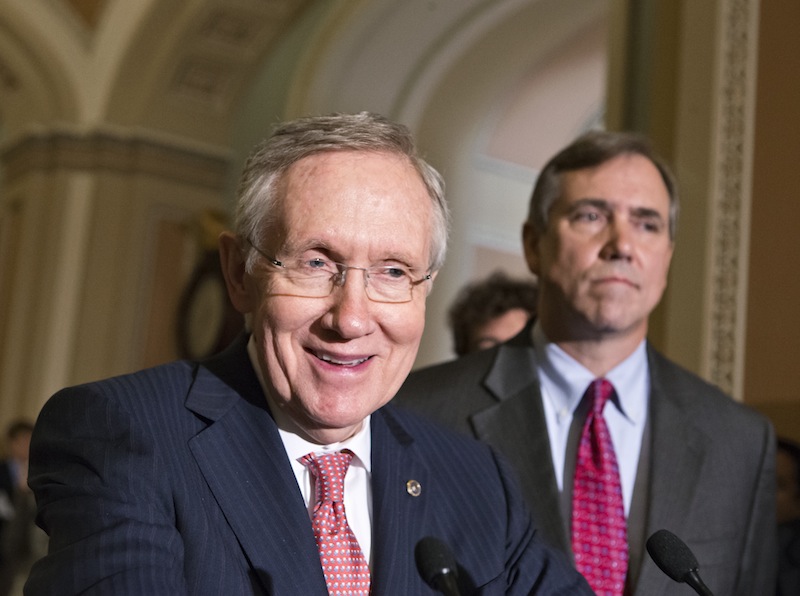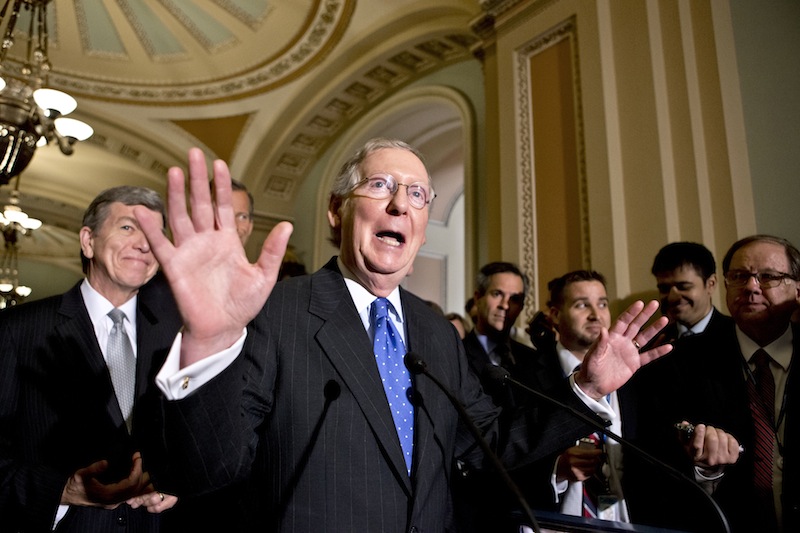WASHINGTON – The Senate averted a political meltdown Tuesday when Republicans agreed to confirm several of President Obama’s executive branch nominees and, in exchange, Democrats agreed to leave existing filibuster rules in place.
Senate Majority Leader Harry Reid, D-Nev., and Sen. John McCain of Arizona, the key Republican negotiator, announced the deal minutes before a scheduled vote on Richard Cordray, Obama’s choice to head the Consumer Financial Protection Bureau. The deal paved the way for Cordray, the acting director of the agency, to be confirmed in a vote Tuesday afternoon. He was nominated in July 2011, but Republicans had refused to confirm him.
Democratic frustration about Cordray and other stalled nominations led Reid to threaten to alter the Senate’s filibuster rules, which allow for unlimited debate unless there are 60 votes to cut it off.
Reid’s threat was to change the rules so that the nominees in question could be confirmed by a simple majority of 51 votes. Democrats have 54 members in their caucus.
As part of the deal, Republicans demanded that Obama withdraw his controversial nominees to the National Labor Relations Board — who had been installed through recess appointment, bypassing the Senate — but in turn guaranteed that the new selections would be confirmed.
The bottom line is that several Obama nominees will be confirmed but the Senate rules will remain unchanged — so Republicans can filibuster in the future and Reid can threaten to unilaterally change the rules again.
The compromise, and the confrontation that preceded it, dealt with some of the Senate’s most obscure parliamentary procedures, but together they broadly captured the partisan politics of the moment. For much of the past 20 years, each side in the minority has employed increasingly blunt tactics to slow or stall nominations and legislation advanced by the majority, often using filibusters to torpedo the majority agenda.
The number of attempted filibusters peaked in 2008, more than doubling the number from 1994, and has tapered downward since. But Democrats insist that the traditional sense of decorum in the chamber hit a nadir earlier this year when junior Republicans attempted to filibuster the nominations of national security posts that have always received overwhelming bipartisan support.
Senators suggested that the spirit of the deal and a marathon bipartisan caucus on Monday night had defused, to some extent, the increasingly hostile partisan posture the two sides had adopted over the past few months.
“I hope that everyone learned the lesson last night that it sure helps to sit down and talk to each other,” Reid said Tuesday morning. “It was a very, very good meeting.”
McCain held out hope that Monday’s rare bipartisan huddle, inside the Old Senate Chamber where key compromises of the 19th century were struck, could be a path forward on other contentious issues, such as immigration reform.
“We need to talk. We just proved that last night,” he told reporters.
Hours after the deal was announced, senators voted 66 to 34 to approve Cordray’s nomination. Twelve Republicans joined the entire Democratic caucus to approve the nominee. Other nominees considered less controversial — to lead the Labor Department, the Environmental Protection Agency and the Export-Import Bank — are expected to be confirmed by the end of the week.
The clear winner from the ugly debate was the president, who will have a full slate of his nominees confirmed and will settle the messy staffing issue at the consumer protection bureau and the labor relations board. Those agencies are the subject of a legal battle that will reach the Supreme Court over Obama’s method of making an end run around Senate confirmation to install interim appointees, threatening to undermine more than 1,000 rulings issued by the labor board in the past 18 months.
The buildup to Tuesday’s deal, however, exposed the greatly deteriorated relationship between Reid and his Republican counterpart, Minority Leader Mitch McConnell of Kentucky. The two men were once hailed as senators who loved the institution first, but their relationship has been in disrepair since at least the 2011 negotiations over raising the federal debt ceiling. In the past week, Reid, 73, and McConnell, 71, have dedicated hours of floor debate to excoriating each other in harsh personal terms. Even as the rest of the Senate was praising Tuesday’s deal, the two leaders’ aides tried to pin the other side’s leader as the big loser.
MAINE’S SENATORS LAUD COMPROMISE
Maine Sens. Susan Collins and Angus King said Tuesday that they were satisfied with the compromise that followed Monday’s gathering of senators.
Collins, a Republican, has said repeatedly that she does not believe filibusters should be used to block votes on Cabinet nominations except in extraordinary circumstances. But Collins had said last week that she believed there were “legitimate issues” with the National Labor Relations Board nominees — lower posts than Cabinet members — who were given recess appointments by Obama.
During Monday night’s meeting, Collins expressed concerns about the “nuclear option” undermining the Senate tradition of protecting the rights of the minority party. She also urged her Democratic colleagues to “look ahead and think about the time when we would have a Republican president with Republican Senate and there could be someone appointed who was completely unacceptable to my Democratic colleagues and was nominated to run their favorite program,” according to The Associated Press.
“All of us who serve in the Senate are but temporary stewards of this great institution, and I have been a part of several recent bipartisan efforts to address gridlock in the Senate without changing its fundamental rules and traditions,” Collins said in a statement. “This agreement allows us to move forward in a way that continues to protect minority rights.”
King, an independent who caucuses with the Democrats, has supported past filibuster reform proposals during his six months in the Senate. On Tuesday, he said the agreement was a positive step in the right direction and credited the “open and candid dialogue” on Monday night with helping avoid a bigger confrontation over Senate rules.
— Kevin Miller, Portland Press Herald’s Washington, D.C. bureau chief, contributed to this report.
Send questions/comments to the editors.




Comments are no longer available on this story